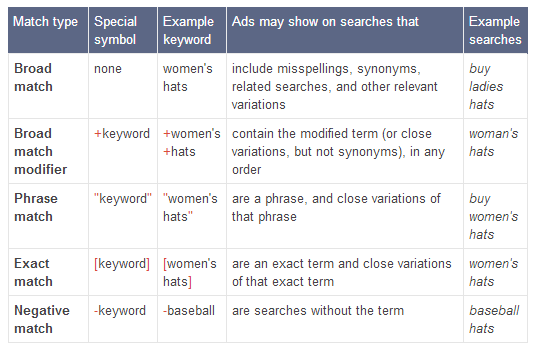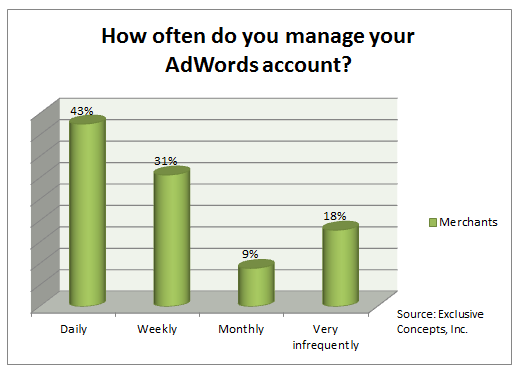My company recently surveyed 100 small and mid-sized online retailers that do not outsource the management of their Google AdWords campaigns. We asked a simple question, “How often do you manage your AdWords account?”
According to the survey results, which are summarized in the graphic below, 27 percent of merchants manage their campaigns monthly or less. Only 43 percent of merchants manage their campaigns daily.
Recent survey results showed 27 percent — 18 percent plus 9 percent — manage their campaigns monthly or less.
Merchants typically attract 72 percent of their site traffic from search engines and recent research shows online retailers spending 68 percent more on pay-per-click advertising than search engine optimization. It’s surprising that most merchants fail to make PPC a daily priority.
Pay-per-click advertising, especially for smaller online merchants, offers the most controllable and scalable source of traffic and revenue available. Taking full advantage of it, even if your ad budget is small, requires constant attention and improvement.
Here are five daily activities to grow your profits from PPC.
1. Use the AdWords Search Query Report
This incredibly useful report shows you the actual phrases used by searchers that click on your ads, along with corresponding data like conversion rates.
These reports are important because many advertisers use match settings that allow their ads to be shown for unspecified keywords.
For example, you might associate the phrase “puppy toys” with a particular ad. But if you are using the “broad match” setting, your ad might trigger a search for “puppy food.”
The search query report gives you that insight, which you can use by making changes to your ad groups and campaigns.
In the scenario above, where you’re accumulating clicks on searches for “puppy food,” you might change your match settings to “modified broad” or “exact.” Or you might establish “puppy food” as a negative keyword, so your ad will stop displaying on those searches.
While you review your search query reports, you may also find examples of particular search queries you never thought of that are turning into sales at unusually high rates.
In that scenario, you might build new ads or campaigns specifically for these unforeseen search queries, to take full advantage of them.
Search query reports provide a wealth of actionable insight, and by reviewing them daily, you’re likely to find immediate quick hits you can use to improve your campaign.
2. Add ‘Offers’ Using Offer Sitelinks Extensions
Now that sitelinks are available at the ad group level, you can update them frequently to promote, say, new products on your site, or to correspond with upcoming holidays.
Ad-group-level sitelinks make frequent ad updates easier.
For example, if Father’s Day is an important holiday for your business, you might add a new sitelink promoting your Father’s Day promotional page.
Timely sales and special offers can drive sales. Take advantage of this by updating your sitelinks.
3. Shift Budget to Surging Ad Groups
Online retail nirvana is having ample supply of a hot products that your competitors don’t have in stock. This can occur any time of the year, but is quite often triggered by events like holidays, storms, or favorable product reviews in popular media.
The sooner you know you’ve struck retail nirvana, the more money you can make. That starts by making sure your ad groups promoting these hot products have the budget they’ll need to capture as many clicks as possible. If it takes you a week or two to shift your budgets accordingly, you might miss out.
If you manage your campaigns daily, you’ll also be more likely to identify surges in ad group performance that don’t necessarily correlate with my concept of “retail nirvana.” For example, you may find “trailheads” like ad groups or keywords with unusually high conversion rates that require a higher budget, for you to fully explore their potential.
While shifting budget to surging campaigns is important, make sure you know the difference between surging campaigns and statistical anomalies. Here’s a good rule of thumb: Once a mistake, twice a coincidence, three time’s a trend.
In other words, don’t be too quick to starve potentially profitable campaigns of funds because they generated a small number of clicks without converting a sale. Conversely, don’t be too quick to increase the budget on an ad group simply because it turned a handful of clicks into a handful of sales. Increase budgets in increments, observe results, and continue incrementing.
4. Test New Ad Copy to Increase Click-through Rates
The best PPC managers create multiple versions of their ads, which they test against each other to maximize click through rates. Your ad’s click-through rate is calculated by dividing ad clicks into impressions. For example, an ad that is clicked 5 times after receiving 100 impressions has a click through rate of 5 percent.
Increasing the click through rate is important because it correlates directly with your AdWords quality score, which can push your ads higher without a commensurate increase in per-click costs.
Each day you can create new variations of your ads, or delete poor-performing versions of ads you tested previously. There’s no end to the kinds of ad copy tests you can run, which can range from simple variations of your copy, to the following.
- Including pricing information in the ad.
- Emphasizing unique benefits of buying from your store.
- Promising sought-after content like reviews or buying guides.
5. Tighten Match Types
Google explains the different match types, which includes the summary of match types, in the table below.
AdWords match type table.
Google’s match type table explains how different match types relate to types of searches. Broad matches include misspellings, synonyms, related searches, and other relevant variations. Broad match modifiers contain close variations of the original term, in any order. Phrase matches include phrases or close phrase variations. Exact matches are an exact term and close variations of an exact keyword term. Negative matches specify searches that do not include a certain term.
I still find many merchants using “broad match,” because that has been Google’s default. Broad match opens you up to the widest pool of traffic, but often that traffic is highly unqualified which leads to unprofitable campaigns.
Spend time each day tightening your match types by identifying poorly performing ad groups and experimenting with different match types, preferably like “broad match modifier” or “exact match.” Broad match modifier is a good default match type for your campaign, but exact match can be useful when you’re targeting high-value but particularly expensive keywords.
Conclusion
Many online retailers learn the hard way that Google makes drastic changes to its organic search algorithm regardless of how those changes impact small businesses. In addition, Google has consistently deemphasized its organic search listings in favor of its paid listings.
As a result, many retailers have to establish or grow their PPC campaigns to compensate for fluctuations in organic search traffic.
PPC isn’t always profitable, however. Many merchants have either abandoned it, or have treated it as a low priority. Unfortunately, in the long term that position will be unsustainable for most merchants.







